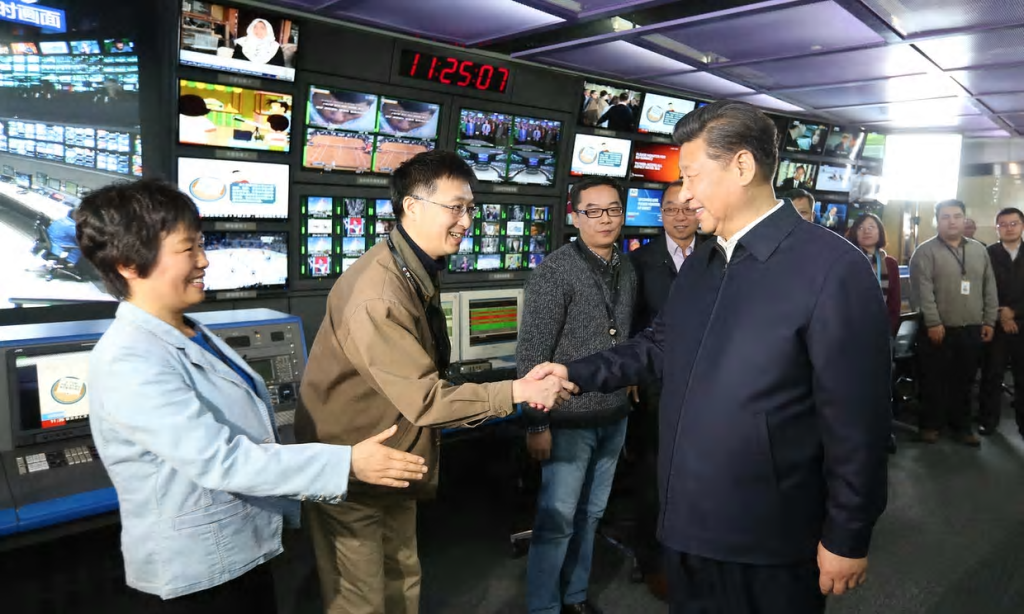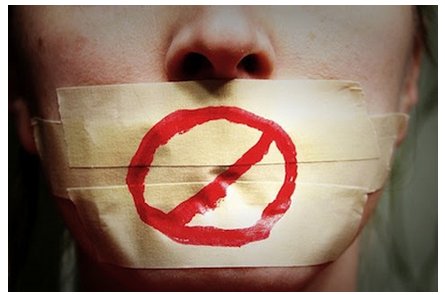Weeks after Xi Jinping demanded loyalty from media, Caixin claims it was ordered to remove interview on free speech

Xi Jinping visiting China Central Television (CCTV) in Beijing on 19 February, where he demanded absolute loyalty from Chinese media. Photograph: Ma Zhancheng/AP
One of China’s most respected current affairs magazines has lashed out at Communist party censorship of its work, just weeks after the president, Xi Jinping, demanded absolute loyalty from his country’s media.
An article on Caixin’s English-language website on Tuesday claimed the Cyberspace Administration of China (CAC) – which it labelled a “government censorship organ” – had ordered the removal of an interview posted on its Chinese-language website that focused on the issue of free speech.
In the purged interview, a prominent Shanghai academic and government adviser called Jiang Hong argued that advisers such as himself should “be free to give Communist party and government agencies suggestions on economic, political, cultural and societal issues”.
However, Caixin claimed that the CAC, Beijing’s internet watchdog, had taken exception to the article, alleging it contained “illegal content”.
In response to that act of censorship, the magazine, which is run by one of China’s most revered journalists, Hu Shuli, took the highly unusual step of challenging the government in an article headlined: Story about Adviser’s Free Speech Comments Removed from Caixin Website.
The piece was illustrated with a photograph of a mouth that had been gagged with masking tape:
 Caixin again interviewed Jiang, who teaches at the Shanghai University of Finance and Economics, who decried the “baffling” episode of censorship.
Caixin again interviewed Jiang, who teaches at the Shanghai University of Finance and Economics, who decried the “baffling” episode of censorship.
“This is terrible and bewildering,” Jiang told the magazine. “I examined [the article] in all respects, but I couldn’t see anything illegal.”
In a tweet, Caixin claimed its article about free speech had made Chinese censors “jittery”.
By Tuesday afternoon the English-language story denouncing the original article’s censorship had itself been removed from the internet and replaced by the message: “Sorry, page not found.”
Caixin’s decision to take on China’s censors comes less than a month after Xi, whose rise to power has seen a severe political tightening, made a high-profile visit to Chinese news outlets to demand their absolute loyalty.
During his tour of three Communist party controlled outlets, Xi instructed journalists that “they must love the party, protect the party, and closely align themselves with the party leadership in thought, politics and action”.
David Bandurski, an expert in Chinese journalism from the University of Hong Kong, said Caixin’s decision to speak out after that visit was both bold and rare.
“It really speaks to a kind of desperation about the environment for journalism in China that they would come out and make an incident of this,” he said. “[It is] all the Ds: despair, depression, despondency.”
“Chinese media are under a lot of pressure right now. They have been under pressure for years, even before Xi Jinping. But it has intensified to such a level under Xi that we are really seeing the erosion of nearly all space for professional media,” added Bandurski, who is the editor of the University of Hong Kong’s China Media Project.
“Everybody is on eggshells. Everybody is walking on glass now. It is such an intense environment of control that no one knows what is possible. No one can get their bearings. This is a real problem for journalists now. How do we play any meaningful role in society if we can’t write much at all and we have no idea what we even can write?”
Bandurski said it was hard to predict whether Caixin would suffer serious sanctions over its decision to take on the Communist party’s censors.
“This could end with the removing of the piece and a stern warning,” he said. “[But] we are kind of throwing our assumptions out of the window with Xi Jinping.”
